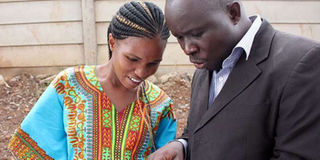Woman who was given wrong HIV diagnosis to get final results soon

Ms Elizabeth Zighe Mwakazi, who was misdiagnosed with HIV and put on ARVs with her toddler son, with Haki Africa programme officer Francis Auma at Kenyatta National Hospital after she underwent tests on November 18, 2016. PHOTO | DENNIS ONSONGO | NATION MEDIA GROUP
What you need to know:
- Ms Mwakazi was misdiagnosed with HIV in July at Diani Health Centre, where she had gone for an ante-natal check-up.
- On the fourth day of taking ARVs, she experienced side-effects such as dizziness, nausea and vomiting, shivers and serious body weakness.
- According to Ms Mwakazi’s husband, Mr Fredrick Omondi, results from this test, which were communicated by phone, showed she was negative.
A woman who was wrongly diagnosed with HIV in Kwale and put on ARVs for three months together with her one-year-old son will get her final status test results by the end of this month from the National HIV Referral Laboratory (NHRL), the Nation has exclusively learnt.
Ms Elizabeth Zighe Mwakazi, 34, and her son, a toddler, flew to Nairobi on Friday morning for advanced tests at the lab, which was done at around midday.
Her son, however, was not tested.
Ms Mwakazi was misdiagnosed with HIV in July at Diani Health Centre, where she had gone for an ante-natal check-up. On the fourth day of taking ARVs, she experienced side-effects such as dizziness, nausea and vomiting, shivers and serious body weakness. Her son suffered similar symptoms and also severe skin rashes, irritability and loss of weight and appetite.
When the story was highlighted on October 17, the board’s officials said they would investigate the source of the misdiagnosis, the qualifications of the person who tested her and the method used.
This led to another advanced test at the end of October, when representatives of the Kenya Medical Laboratory Technicians and Technologists Board (KMLTTB) visited her home in Ukunda, Kwale County, and took samples of her blood.
SHE WAS NEGATIVE
According to Ms Mwakazi’s husband, Mr Fredrick Omondi, results from this test, which were communicated by phone, showed she was negative, but the results were not sent to them as expected. However, on Friday, the NHRL said it would discard the earlier test and take fresh samples.
Ms Mwakazi told the Nation: “They said they would not authoritatively give the results because of the testing site and where they picked the samples.
“They said the heat in Mombasa and the transportation of the samples to Nairobi might have affected the test and a fresh one was vital. Therefore, I needed to be here at the lab for it.”
The new tests — whose results will be delivered in person to the family — were done by experts from the National Aids Control Programme and KMLTTB. Ms Mwakazi was told her blood samples will go through various tests for the final results.
“They were very kind and understanding and have counselled me,” said Ms Mwakazi. “Honestly, they were very helpful in making this process easier.
“I know, deep in my heart, that I am negative and I will await their results as they said, then we see the way forward.”
SEVEN MONTHS PREGNANT
Ms Mwakazi, who is seven months pregnant, has had to go through a battery of tests after she was told she was HIV positive in June and put on ARVs but, shortly thereafter, she stopped due to adverse effects. So far, she has done five HIV tests, all of which have turned out negative.
Mr Omondi told the Nation that it was difficult for the family to “move forward unless we know what the final results say”. He added on phone from Mombasa: “We understand that there are procedures and processes and we will respect that.
“We will wait and see.”
A human rights activist, Mr Francis Auma, accompanied Ms Mwakazi to the lab in the place of her husband. He said the organisation would help Ms Mwakazi and her son to get justice after the misdiagnosis.
He told the Nation in Nairobi shortly before the flight home: “This has not been easy for this family; it almost tore them apart and Ms Mwakazi and her son almost died.
“In fact, at some point, Ms Mwakazi had lost hope and wanted to die but her husband came just in time and helped her.”
Ms Mwakazi’s antenatal test was carried out using the rapid test kit, which is said to be accurate most of the time but can be unclear, especially if healthcare workers do not follow stipulated procedures or if the samples are poorly stored.
In addition, laboratory reagents should also be stored under specified temperatures or they could lead to erroneous results.





